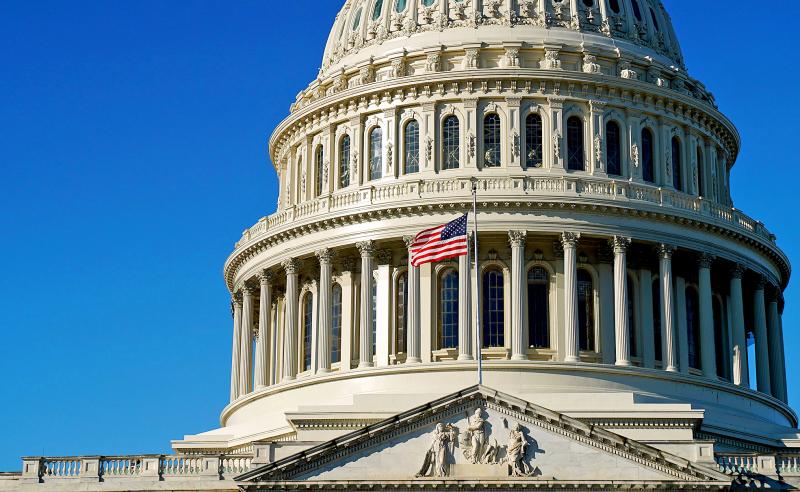A bipartisan group of 52 US senators on Wednesday urged US President Joe Biden to include Taiwan in the in the Indo-Pacific Economic Framework (IPEF), amid concerns that Taiwan would be left out of the agreement.
Democratic Senator Bob Menendez and Republican Senator Jim Risch led 50 other senators from both parties in penning a letter to Biden, saying that including Taiwan in the IPEF would be an invaluable signal of Washington’s “rock solid commitment” to Taiwan, and its prosperity and freedom, they said in a press release.
Expressing their concerns that “Taiwan will not be included in the proposed IPEF,” the senators underlined the important role that Taiwan plays in global supply chains, and in trade and economic relationships with the US, as well as the potential consequences of Taiwan’s exclusion.

Photo: Reuters
“Excluding Taiwan from IPEF would significantly distort the regional and global economic architecture, run counter to US economic interests, and allow the Chinese government to claim that the international community does not in fact support meaningful engagement with Taiwan,” the letter read.
The IPEF, an initiative that Biden proposed last year, aims to enhance the US’ economic engagement in the Indo-Pacific region.
It has yet to be clearly defined. A US Congressional Research Service report last month said the framework would include modules covering “fair and resilient trade, supply chain resilience, infrastructure and decarbonization, and tax and anticorruption.”
Thanking the US senators for their support, Minister of Economic Affairs Wang Mei-hua (王美花) yesterday said the ministry would push for Taiwan’s inclusion in the IPEF “step by step” through the “direct channels of communication” between the ministry and the US.
The senators’ support showed that Taiwan’s important role in global supply chains has been recognized by the US, which is a positive development in Taiwan’s pursuit of IPEF inclusion, Wang said at a meeting of the legislature’s Economic Committee.
Media reports in recent months, citing unnamed sources, said that Taiwan was not among the US’ prospective IPEF partners, despite Taipei’s repeated expressions of interest in joining it.
An article published by Politico on Feb. 28 quoted a former US trade official, who asked not to be identified, as saying that she did not believe the Biden administration would allow Taiwan into the IPEF.
“I think the challenge with Taiwan is that this is the administration’s initiative on Asia, and they have been fairly cognizant of the fact that other countries will not want to be associated with an initiative that is seen to be primarily an anti-China coalition,” the former official said.
In an article on March 31, Reuters, quoting unnamed sources, said that US Secretary of Commerce Gina Raimondo told a closed-door meeting of the US Senate Committee on Finance the week before that the Biden administration was not contemplating Taiwan’s inclusion at this time.
When asked by US lawmakers in recent months whether Taiwan would be invited to join the IPEF, US Secretary of State Antony Blinken and US Trade Representative Katherine Tai (戴琪) were noncommittal and did not offer specifics.
A bipartisan group of 200 US House representatives on March 30 sent a letter to Raimondo and Tai to petition for Taiwan’s inclusion in the IPEF.

CHAOS: Iranians took to the streets playing celebratory music after reports of Khamenei’s death on Saturday, while mourners also gathered in Tehran yesterday Iranian Supreme Leader Ayatollah Ali Khamenei was killed in a major attack on Iran launched by Israel and the US, throwing the future of the Islamic republic into doubt and raising the risk of regional instability. Iranian state television and the state-run IRNA news agency announced the 86-year-old’s death early yesterday. US President Donald Trump said it gave Iranians their “greatest chance” to “take back” their country. The announcements came after a joint US and Israeli aerial bombardment that targeted Iranian military and governmental sites. Trump said the “heavy and pinpoint bombing” would continue through the week or as long

TRUST: The KMT said it respected the US’ timing and considerations, and hoped it would continue to honor its commitments to helping Taiwan bolster its defenses and deterrence US President Donald Trump is delaying a multibillion-dollar arms sale to Taiwan to ensure his visit to Beijing is successful, a New York Times report said. The weapons sales package has stalled in the US Department of State, the report said, citing US officials it did not identify. The White House has told agencies not to push forward ahead of Trump’s meeting with Chinese President Xi Jinping (習近平), it said. The two last month held a phone call to discuss trade and geopolitical flashpoints ahead of the summit. Xi raised the Taiwan issue and urged the US to handle arms sales to

State-run CPC Corp, Taiwan (CPC, 台灣中油) yesterday said that it had confirmed on Saturday night with its liquefied natural gas (LNG) and crude oil suppliers that shipments are proceeding as scheduled and that domestic supplies remain unaffected. The CPC yesterday announced the gasoline and diesel prices will rise by NT$0.2 and NT$0.4 per liter, respectively, starting Monday, citing Middle East tensions and blizzards in the eastern United States. CPC also iterated it has been reducing the proportion of crude oil imports from the Middle East and diversifying its supply sources in the past few years in response to geopolitical risks, expanding

Pro-democracy media tycoon Jimmy Lai’s (黎智英) fraud conviction and prison sentence were yesterday overturned by a Hong Kong court, in a surprise legal decision that comes soon after Lai was jailed for 20 years on a separate national security charge. Judges Jeremy Poon (潘兆初), Anthea Pang (彭寶琴) and Derek Pang (彭偉昌) said in the judgement that they allowed the appeal from Lai, and another defendant in the case, to proceed, as a lower court judge had “erred.” “The Court of Appeal gave them leave to appeal against their conviction, allowed their appeals, quashed the convictions and set aside the sentences,” the judges